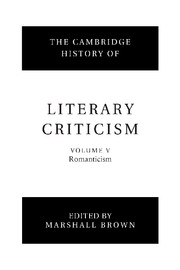Book contents
- Frontmatter
- Introduction
- 1 Classical standards in the period
- 2 Innovation and modernity
- 3 The French Revolution
- 4 Transcendental philosophy and Romantic criticism
- 5 Nature
- 6 Scientific models
- 7 Religion and literature
- 8 Language theory and the art of understanding
- 9 The transformation of rhetoric
- 10 Romantic irony
- 11 Theories of genre
- 12 Theory of the novel
- 13 The impact of Shakespeare
- 14 The vocation of criticism and the crisis of the republic of letters
- 15 Women, gender and literary criticism
- 16 Literary history and historicism
- 17 Literature and the other arts
- Bibliography
- Index
- References
16 - Literary history and historicism
Published online by Cambridge University Press: 28 March 2008
- Frontmatter
- Introduction
- 1 Classical standards in the period
- 2 Innovation and modernity
- 3 The French Revolution
- 4 Transcendental philosophy and Romantic criticism
- 5 Nature
- 6 Scientific models
- 7 Religion and literature
- 8 Language theory and the art of understanding
- 9 The transformation of rhetoric
- 10 Romantic irony
- 11 Theories of genre
- 12 Theory of the novel
- 13 The impact of Shakespeare
- 14 The vocation of criticism and the crisis of the republic of letters
- 15 Women, gender and literary criticism
- 16 Literary history and historicism
- 17 Literature and the other arts
- Bibliography
- Index
- References
Summary
Literary history was created in the Romantic age. René Wellek traces its origins to English and Scottish intellectuals of the eighteenth century – Robert Lowth, Thomas Percy, John Brown, Thomas Warton and many another. They thought their way to the basic concepts of literary history (The rise of English literary history, pp. 200–1). If their contributions are now less remembered, a reason is that in Germany Herder collected their ideas, along with those of Leibniz, Kant, Hamann and Winckelmann, and voiced them more assertively. He is perhaps the father of literary history – at least of its programme, though he was unready to chew as much straw as is necessary to write it. There were important essays by French writers, such as Madame de Staël's On literature considered in its relations with social institutions (1800) and Chateaubriand's Genius of Christianity (1802), but after the 1780s, the development of literary history proceeded mainly in Germany.
Which was the first literary history? We are speaking, of course, of the first in a modern kind. The older kind was a history of learning, historia litterarum, a project Francis Bacon had recommended: ‘the general state of learning to be described and represented from age to age… without which the history of the world seemeth to me to be as the statua of Polyphemus with his eye out; that part being wanting which doth most show the spirit and life of the person’. As time passed, the histories of learning became more sophisticated, but as late as 1839, in Henry Hallam's impressive volumes, they were still essentially compendia.
- Type
- Chapter
- Information
- The Cambridge History of Literary Criticism , pp. 338 - 361Publisher: Cambridge University PressPrint publication year: 2000
References
- 1
- Cited by

